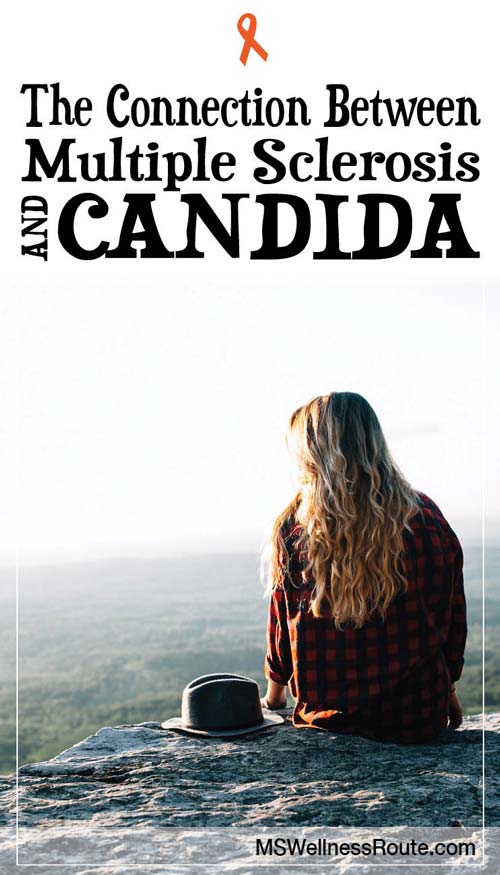Last Updated on January 27, 2025 by Cathy

Candida Albicans is a yeast found in small amounts in the human body, it is harmless and part of the normal gut flora. However, when it is overgrown it can lead to serious health problems. Researchers have linked multiple sclerosis and candida.
A Harvard University study discovered Candida is the main fungal infection behind human diseases. When your gut is out of balance, your immune system is weakened causing you to have a greater risk for severe health issues. Most people don’t even realize they have yeast overgrowth. That is until they start experiencing problems.
Candida is the most common cause of fungal infections worldwide. People know it as other common names such as:
- Athlete’s foot
- Diaper rash
- Jock itch
- Nail fungus
- Oral thrush
- Vaginal yeast infection
As Candida grows its toxic byproducts enter the bloodstream. Affecting the blood-brain barrier and the organs. Once the toxins enter the bloodstream it triggers an autoimmune response. Eventually, this leads to the development of chronic health problems. Such as autoimmune diseases in addition to wreaking havoc throughout the entire body.
Candida and Multiple Sclerosis
Two separate studies in 2010 in Spain and 2012 in Switzerland have linked Candida with the onset of MS. It has also connected other autoimmune diseases (graves, rheumatoid arthritis, colitis, lupus). The study found that cells of the fungus seem to trigger the immune system. Which produces more inflammation.
MS is caused by inflammation when the body’s immune cells attack the nervous system. This occurs in the brain and spinal cord nerve which breaks down the myelin that protects the nerves.
What causes Candida?
Diet
The standard diet is a smorgasbord for Candida since it feeds on sugar and carbohydrates. Most processed foods contain refined sugar. Which suppresses your immune system leaving it defenseless for the yeast to grow.
Antibiotics
Whenever you take a round of antibiotics, it is not only killing the bad bacteria but it is also killing the good bacteria. Since it’s the good bacteria that keep Candida at a healthy level, it is now free to grow.
Stress
It is hard to completely avoid stress, however, when your body is under constant stress it releases the stress hormone Cortisol. This hormone weakens the immune system causing an elevated level of blood sugar, this is the “fight or flight” response. Since yeast feeds off sugar, it is able to grow much faster.
Birth Control Pills
Estrogen is the main ingredient in “The Pill” creating a hormonal imbalance. By disturbing this balance, Candida develops rapidly overwhelming the friendly bacteria.
Quick Links to information in this post:
• How Antibiotics Cause Multiple Sclerosis
• How to Tell If You Have Candida
• Foods to Eat and Foods to Avoid with MS and Candida
How do I know if I have Candida?
Many people have an overgrowth of Candida Albicans and are unaware of its severity and remain undiagnosed. Doctors are trained in one area yet don’t recognize it as a system-wide connection affecting the entire body, especially the nervous system (examples: neurologist, gastroenteritis, rheumatologists).
Unfortunately, some doctors do not believe in Candida overgrowth. You need to find a doctor or functional medicine practitioner who will work with you to stop the damage. Not just put a “band-aid” on it.
Click here to find a functional medicine practitioner.
What happens when I have an overgrowth of Candida?
Candida becomes an invasive overgrowth. It punches its way through a healthy gut lining attacking the entire body including organs. Toxins and larger food particles enter the bloodstream and into the blood-brain barrier.
It is a debilitating condition that can trigger many conditions. Including MS and other autoimmune diseases. Candida feeds off sugar and carbohydrates, the more you eat the more it grows.
Unfortunately, many people’s gut bacteria is not balanced due to the overuse of antibiotics, birth control pills, and a poor diet. When taking antibiotics it not only kills the good but also the bad bacteria. Candida is not affected allowing it to grow.
How can I stop Candida?
You can have your doctor test you, unfortunately, most doctors don’t recognize Candida as a problem with MS. You can also do a simple test at home, however, this did not work for me. It showed I didn’t have Candida and I know I did due to oral thrush, dry skin, overuse of antibiotics, and MS.
Candida test you can try at home:
- After waking up in the morning, before you brush your teeth, eat, or drink, spit into a glass of room-temperature water.
- Wait one hour, checking every 15 minutes.
- If there are strings coming down that is a sign you may have Candida.
Candida is evasive and cannot easily be cleared making it very hard to stop the overgrowth. Its cells can resemble human cells including cells found in our brain.
When you start taking antifungals, the Candida becomes resistant. Which makes the antifungals no longer effective. Change your antifungals every few weeks until you find what works for you. It is extremely important to continue taking them to fight against Candida! You may want to start slowly to prevent a “die-off” reaction if you do stop taking them then start again at a lower dose.
3 Steps to Healing
1 – Diet
You do not want to kill yeast off entirely, it is part of our healthy digestion system. Instead, eat a healthy diet that is high in fruits and vegetables and avoid processed foods. Eating an anti-inflammatory diet will help bring Candida down and the yeast back to a healthy level.
To start an anti-inflammatory diet read: How To Start An Anti-Inflammatory Diet
2 – Probiotics
Probiotics are the “good bacteria” that live in your gut. They not only compete with Candida overgrowth, but they also maintain the natural acidity in your gut. Preventing Candida from turning into the fungal form.
3 – Antifungals
There are two different prescription antifungals, Nystatin and Diflucan. Doctors don’t like prescribing these because they are hard on your liver. There are many supplements that can help. Contact your doctor or functional medicine provider.
It is best to take herbal antifungals, here are a few you can use:
- Caprylic acid (coconut oil)
- Garlic
- Oregano oil
- Grapefruit seed extract
- Rutabaga
- Herbal teas (Pau d’Arco, chamomile, ginger, licorice root, and peppermint)
It is also a good idea to drink some herbal teas to help your liver detox from toxins caused by the die-off of Candida. Good choices of herbal teas are dandelion and red clover teas. However, you may want to avoid these if you have grass allergies.
Avoid
- Gluten
- Refined sugar and carbohydrates
- Fruit except for lemons, limes, grapefruits, and berries
- Antibiotics (unless medically necessary)
- Steroids
- Birth Control Pills
- Yeast Containing Foods
- Coffee
- Vinegar except for organic apple cider vinegar
- Yeast (baker’s yeast, brewer’s yeast, nutritional yeast)
Many websites/blogs promote avoiding fruit that is high in sugar, I was one of them. But, researching studies on PubMed fruit does not increase a person’s blood sugar. After studying people with type 2 diabetes, consuming fruit does the exact opposite. It helps control blood sugar due to its high fiber content.
Do not be afraid to consume fruit. Fruit is high in antioxidants, fiber, and an excellent source of vitamins and minerals.
Summing It Up
Overall, restoring your body back to health requires balance back into your intestinal flora. This is NOT a quick fix, depending on how long and how severe your Candida overgrowth is. This will determine how long it takes to get it under control.
Finally, you need to get your yeast overgrowth back to a healthy level. You do that by managing your diet, lifestyle, stress, and toxins to help rebuild your immune system. This is not easy, it can take years before you start to see any improvements. Although some people begin to see results after a few months.
Don’t give up, stay positive in addition believe that you will heal!

Get Access to my FREE Resource Library filled with many printables for your wellness journey!
Want to remember this health tip? Pin it to your favorite Pinterest board!

Resources:
https://www.sciencedaily.com/releases/2012/04/120405075223.htm
The Connection Between MS And Candida





